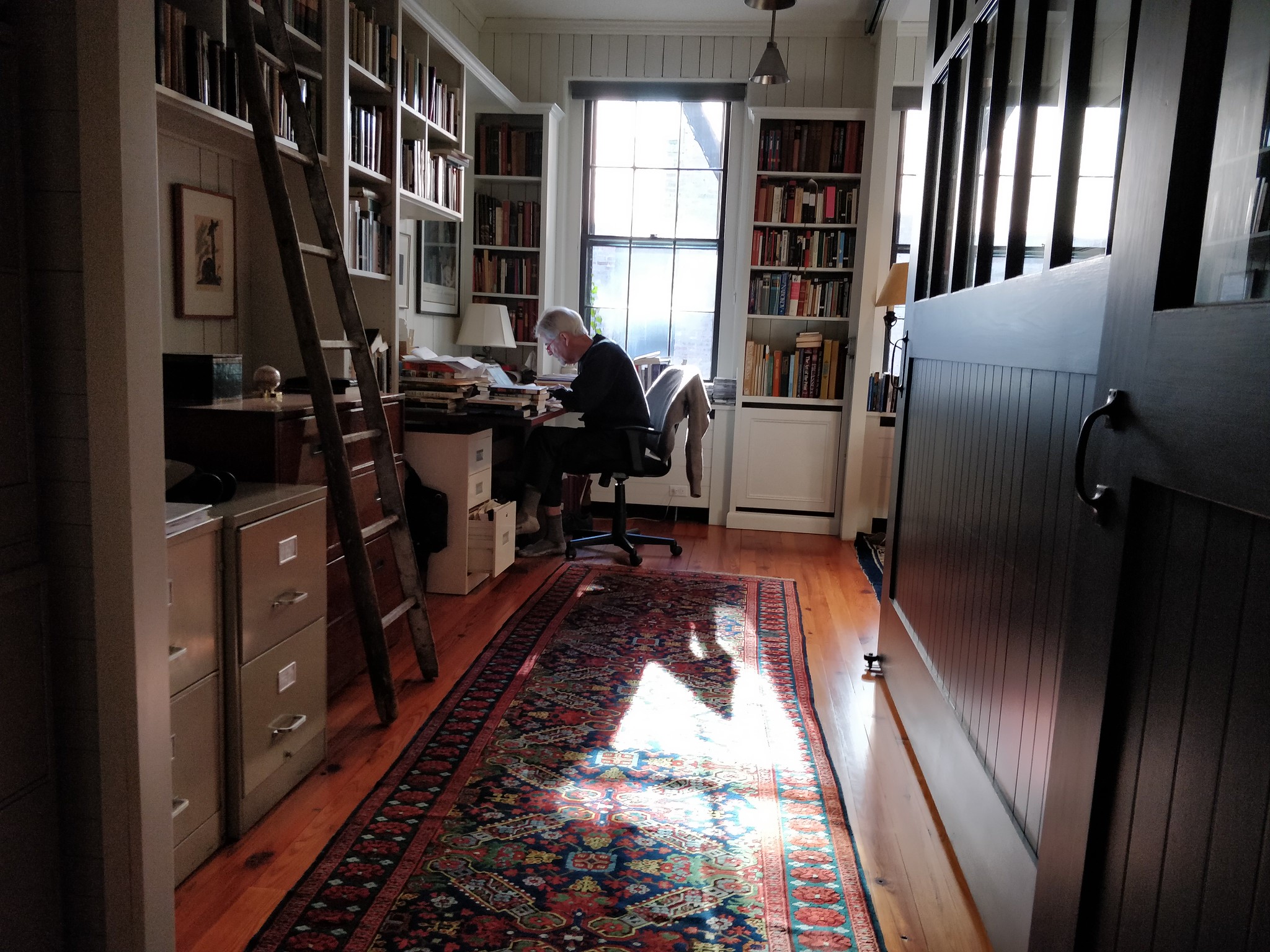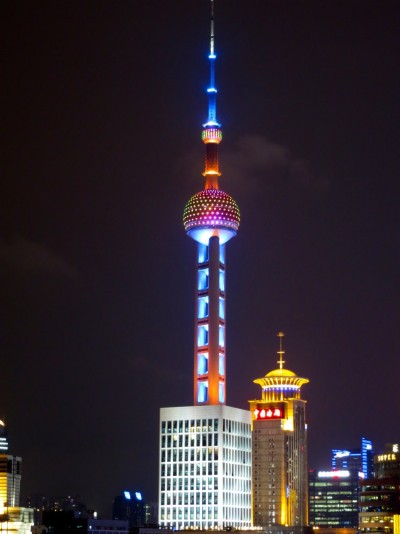Somehow the end of a year (and a decade this time) doesn’t feel right if I don’t find myself at the dinner table in Boston sitting across from Christopher Lydon. The voice of the world’s first podcast, he’s been my north star ever since I started this thing long before itunes had podcasts or NPR knew what to do with the internet. As luck- or perhaps fate– would have it, Chris and I have become close friends over the years and the annual “where are we, what happened, where are we going” podcast conversation are among my most favorite rituals. (right after oatmeal, working on an episode of ROS with Mary and the team, and a historical walk around a neighborhood of Boston).
This year we can’t help but talk about the socio-policial state of the world, as well as the environmental crisis we continue to march towards. Then there’s music, books, conversations that have been important to us which may shed some light on why all this is happening and what there is to appreciate or condemn when all is said and done. Lastly, as good friends surely will, we take time to appreciate one another, as we both arrive at landmark decades when it comes to age and wisdom.
Listen in and stay for the whole ride for what is an honest and heartfelt conversation… to end one year and welcome in another.
Tag Archives: china
Live from Shanghai: In the Land of China
The following is a podcast of my reflections and things I have learned during my educational visit to Shanghai this week. Have a listen!
Zambians in China
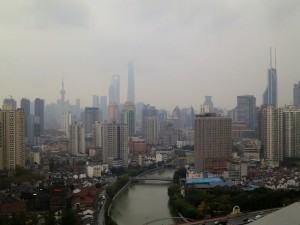 The Dubai to Shanghai Emirates flight is jam packed with people eager to get to the people’s republic. I’m in the aisle seat with two jovial middle aged men to my right. They’re joking about the food or the flight attendant who always ignores their requests for food or drink, they speak with different accents yet they seem to know each other fairly well. The jokes are funny and kind hearted- it is going to be a nice flight.
The Dubai to Shanghai Emirates flight is jam packed with people eager to get to the people’s republic. I’m in the aisle seat with two jovial middle aged men to my right. They’re joking about the food or the flight attendant who always ignores their requests for food or drink, they speak with different accents yet they seem to know each other fairly well. The jokes are funny and kind hearted- it is going to be a nice flight.
Along the way more jokes mixed with pearls of wisdom about travel, airplanes, doing business in China as well as life in Zambia. These two gentlemen live in Zambia. One is a native son of Zambia with a fantastic sense of humor and a kindness you rarely see on a long haul flight. The other, to my surprise, is Portuguese, working the last decade or so for a Portuguese construction company based in Zambia. Their destination, a construction vehicle exposition in Shanghai. Because as you should already know and these two gentlemen remind me, down in Africa, it is the Chinese that go for every contract and manufacture some of the most budget friendly vehicles for those big infrastructure projects.
“You never know what you’re going to get; sometimes the projects are done well and you can see it when roads or houses last over the years. Other times the projects are of poor quality; roads and structures are falling apart within only a few years… you have to be careful because choosing the lowest bidder is not always the best thing for the country in the long term.”
Again, themes we hear about in the press and from first hand observers over the past decade. The conversation carries on and each man shares experiences dealing with Chinese development corporations and machinery companies; the good sides, the bad sides, the in between details. They’re both pleased to be coming to Shanghai, a place that is tens of thousands of miles away from home but that plays a very significant role it what happens there in the coming years.
As we made our approach to Pudong Airport, the interesting conversation carried on, moving from Portuguese politics to Zambian politics and the intricacies of each. Pulling into the gate, cards are exchanged, handshakes, best wishes, and off we go to our respective missions in China. I make a mental note, get over to Zambia, I’d like to see that lovely country.
Welcome to the Future, China
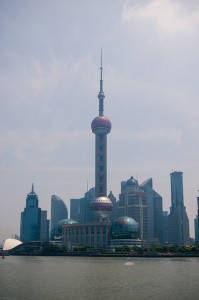
During a presentation today, somewhere in Shanghai in a tall shiny building, a slide went up showing Shanghai’s PuDong skyline in 1990; green, flat, open space; and Pudong in 2014; packed with skyscaper after skyscraper, the new avatar of this megacity. In 24 years it is almost unfathomable how much a place can change. It is pretty. It is cool. Is it good? Surely for somebody. Is it bad? Oh, surely in a few ways as well. But is it real – at this point I can tell you it is very real.
I feel like I grew up in the era where people said China would be an economic powerhouse, and now I live as an adult in that world. But somehow it is always a media story, always filtered through the internet and second hand stories, when you see it up close, that is when the world as you know it looks very different. That is when predictions and forecasts become reality.
“They don’t speak much english,” my fellow travelers often remark about people in Shanghai. — Why should they? It is their world. This one and the big one out there. And the way this powerful wind blows, it is for us to learn about them far less then it is for them to learn about us. Even if both of those would be beneficial to all and fun.
I can’t yet tell you about Shanghai. After seven days I probably still won’t be qualified or capable. But here on the ground in South Shanghai where buildings are low and the streets are empty at night, it is above all an interesting and intricate world. I’m only in the beginning phases of getting to know it.
CTRP Heads to China
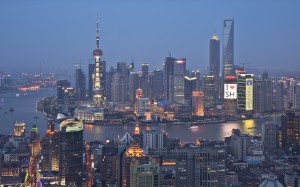
Since it started some 14 years ago, this website has been a chronicle of some unforgettable journeys to various corners of the Earth. Being able to share observations and lessons learned has long been one of the pleasures of keeping this place running.
This week, another milestone in the adventure category: I’m off to Shanghai, China.
Shanghai, city of legend, city of the masses, this benchmark for both the past and present, and probably the future too. Biggest city in the world. Economic powerhouse. These are the factoids I read and influence how I approach this journey. I expect crowds. I expect noise. I expect dumplings!
Stay tuned. After a sleepy few months, there are going to be travel stories on CTRP again!
The Opium War Syndrome Continues
Writer and historian Amitav Ghosh writes about the Opium Wars of the later part of the 1800’s, a time where not unlike today, the western world had wracked up a great trade deficit with China. And also just like today, the dominant discourse that was proselytized like the answer to all ills, was what they called free trade. The benefactors of this trade were some of the largest corporations of that era, the British East India Company and names like that. They all claimed that free trade was their goal and insisted that empires in the east adopt this practice for the good of the world. But with this good came a long list of problems, as western traders pushed Opium on Chinese traders, and eventually triggered the Opium Wars.
 In the US education system, both primary and higher education, the Opium Wars are hardly mentioned. Children are taught that it was a British problem, a disagreement with the Chinese, and has nothing to do with the United States or these modern times we live in. But in fact, the opposite is true. The US played a major role, with relatives of presidents Thomas Jefferson, Calvin Coolidge, and even the Delano (Roosevelt) family being major investors in the Opium trade. And once we again we find ourselves in an era where nations claim free trade will solve the problems of the world, while at the same time pushing, secretly or overtly, monopolies and other “unfree” business tactics.
In the US education system, both primary and higher education, the Opium Wars are hardly mentioned. Children are taught that it was a British problem, a disagreement with the Chinese, and has nothing to do with the United States or these modern times we live in. But in fact, the opposite is true. The US played a major role, with relatives of presidents Thomas Jefferson, Calvin Coolidge, and even the Delano (Roosevelt) family being major investors in the Opium trade. And once we again we find ourselves in an era where nations claim free trade will solve the problems of the world, while at the same time pushing, secretly or overtly, monopolies and other “unfree” business tactics.
As people around the United States and throughout the western world occupy and retake public spaces and confront centers of business and trade, I wonder if they know how far back the practices they are raging against go. The lives we know, for well over a century have been built on top of deep traditions connected to corruption and greed at the expense of massive groups of people. How do you halt or change a system so deeply ingrained in how things function? I think its a good time to revisit the Opium Wars, especially for those of us who don’t know the lessons that were never learned.
